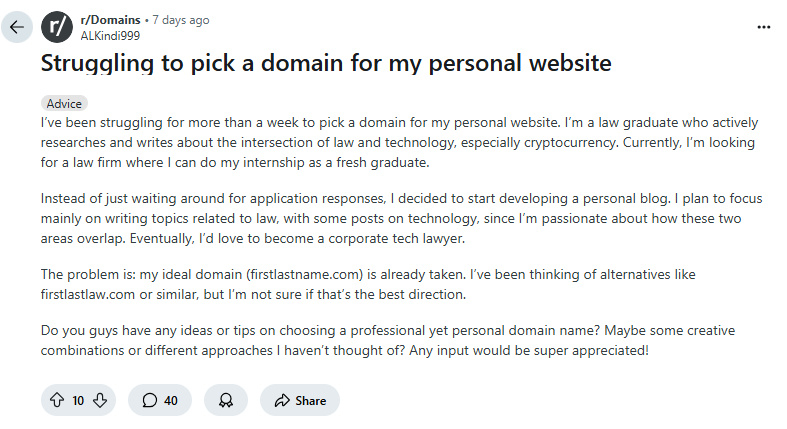- Joined
- Oct 12, 2023
- Posts
- 207
- Reaction score
- 60
Whether you’re building a digital portfolio, personal blog, or branding hub, choosing the right domain name matters. But how do you know which personal website domain is the right fit?
Our guide breaks down what to consider when picking a domain name for a personal website, what options are available, and how to make a decision that feels like you.
When it comes to a personal website, your domain name isn’t just a URL – it’s part of your identity. It can shape how people remember you, how they find you, and how professional you appear online. Many professionals now treat personal websites as digital business cards or portfolios.
A strong personal website name can:

Source: Unsplash
There are no strict rules, but there are a few ingredients that make a good domain name stand out:
Shorter names are easier to type, say out loud, and remember. For example, alexsmith.it.com is cleaner than alexsmithportfolioonline2025.it.com.
Avoid numbers, hyphens, or confusing spellings. These small choices can reduce the chance of typos and missed visits.
Are you building a personal blog, portfolio, or brand site? This affects the tone of your domain. For example:

Source: Unsplash
If you’re focusing on a particular career path, take a look at how others in your space are naming their websites. Discussions on Quora are a great place to start for inspiration.
However, consider if the name will still be relevant if your interests or career path evolve. For example, a domain like johnsmithphotography.it.com might be too narrow if you later expand into video production.
Domain extensions, also known as TLDs (top-level domains), are the endings like .com, .net, or .it.com. While .com is still widely recognized, many modern users are branching out to alternatives like .it.com to stand out while keeping things professional.
Some advantages of using a domain like yourname.it.com include:
If you’re unsure about extensions, get inspired by how professionals choose a domain name for personal brand as shared in Forbes.
Start with a list of keywords related to your name, profession, niche, or interest. Then try combining and testing them. For example:
You can also explore name generators or even ask for feedback in forums like this question on Reddit where users share ideas and struggles when choosing a domain.

Source: Reddit
The right domain name depends on the type of personal site you’re creating. Here’s a quick comparison:
Once you’ve settled on a name, you’ll want to register it before someone else does. Domain names are leased annually, and most platforms let you secure a name for multiple years at a time.
Here’s a quick overview of the process:
Want to keep it simple? Many people start with a one-page website, which is easy to build and maintain while still making a great impression.

Source: Unsplash
Finding the right domain name for a personal website doesn’t have to be overwhelming. With the right mix of clarity, creativity, and purpose, your personal website domain can help you build a digital identity that truly reflects who you are and put you in control of your online story.
A good personal website name is clear, easy to remember, and reflects your identity or purpose. Many people use their full name, like danielgreen.it.com, or combine it with their niche, such as danielcodes.it.com.
Start by checking if your desired domain is available through a domain search tool. Choose a suitable extension like .it.com, then register it through a provider. From there, you can connect it to your website platform.
It depends on your goals. A blog might go with something creative, while a professional site might stick to a full name. Consider what best represents your online identity and what visitors will expect to see.
Look for something that sounds professional and is easy to remember. Using your full name or your name plus your skill (like elladesigns.it.com) can be effective for portfolios.
While .com is common, alternatives like .it.com offer more availability and modern appeal. They work well across different personal site types, from blogs to portfolios.
Get inspired to grow online – visit it.com Domains blog and follow us on social media.
Continue reading at the it.com Domains blog...
Our guide breaks down what to consider when picking a domain name for a personal website, what options are available, and how to make a decision that feels like you.
Why Your Personal Domain Name Matters
When it comes to a personal website, your domain name isn’t just a URL – it’s part of your identity. It can shape how people remember you, how they find you, and how professional you appear online. Many professionals now treat personal websites as digital business cards or portfolios.
A strong personal website name can:
- Help people find your work easily
- Build consistency across platforms, including social media handles
- Make you look more credible to potential clients or employers

Source: Unsplash
What to Include in a Personal Website Domain
There are no strict rules, but there are a few ingredients that make a good domain name stand out:
Keep it simple and memorable
Shorter names are easier to type, say out loud, and remember. For example, alexsmith.it.com is cleaner than alexsmithportfolioonline2025.it.com.
Avoid numbers, hyphens, or confusing spellings. These small choices can reduce the chance of typos and missed visits.
Reflect your purpose
Are you building a personal blog, portfolio, or brand site? This affects the tone of your domain. For example:
- A portfolio domain name might be janedoedesign.it.com
- A personal blog might go with something like writesbyalex.it.com
- A professional branding site might choose chrisjordan.it.com

Source: Unsplash
If you’re focusing on a particular career path, take a look at how others in your space are naming their websites. Discussions on Quora are a great place to start for inspiration.
However, consider if the name will still be relevant if your interests or career path evolve. For example, a domain like johnsmithphotography.it.com might be too narrow if you later expand into video production.
Choose the right domain extension
Domain extensions, also known as TLDs (top-level domains), are the endings like .com, .net, or .it.com. While .com is still widely recognized, many modern users are branching out to alternatives like .it.com to stand out while keeping things professional.
Some advantages of using a domain like yourname.it.com include:
- Availability – many first-choice names are still open
- Recognition – .it.com feels global, tech-forward, and personal
- Flexibility – it works for blogs, portfolios, startups, and more
If you’re unsure about extensions, get inspired by how professionals choose a domain name for personal brand as shared in Forbes.
How to Brainstorm a Personal Domain Name
Start with a list of keywords related to your name, profession, niche, or interest. Then try combining and testing them. For example:
- Full name: saramendez.it.com
- Name + niche: saracodes.it.com
- Creative twist using a domain hack: icancode.it.com
You can also explore name generators or even ask for feedback in forums like this question on Reddit where users share ideas and struggles when choosing a domain.

Source: Reddit
Comparing Different Types of Personal Websites
The right domain name depends on the type of personal site you’re creating. Here’s a quick comparison:
| Website type | Example domain name | Things to consider |
| Personal blog | jennwrites.it.com | Tone should be authentic and creative |
| Online portfolio | robbuilds.it.com | Clear and professional is best |
| Branding site | samuelrichards.it.com | Use your full name for a strong identity |
| Local business | taylorsalon.it.com | Include location or service keywords (see domain name for a local business) |
| Startup founder | emilytech.it.com | Blend personal and tech branding (see domain name for an IT startup) |
| Personal blog niche | wanderingwithlee.it.com | Personal flair + niche topic (see domain name for a blog) |
Registering Your Domain
Once you’ve settled on a name, you’ll want to register it before someone else does. Domain names are leased annually, and most platforms let you secure a name for multiple years at a time.
Here’s a quick overview of the process:
- Use a domain search tool to check availability – here are some great AI tools that can help
- Choose your preferred extension
- Register your domain
- Connect it to your website platform
Want to keep it simple? Many people start with a one-page website, which is easy to build and maintain while still making a great impression.

Source: Unsplash
Finding the right domain name for a personal website doesn’t have to be overwhelming. With the right mix of clarity, creativity, and purpose, your personal website domain can help you build a digital identity that truly reflects who you are and put you in control of your online story.
FAQs
What is a good name for a personal website?
A good personal website name is clear, easy to remember, and reflects your identity or purpose. Many people use their full name, like danielgreen.it.com, or combine it with their niche, such as danielcodes.it.com.
How to get a personal website domain?
Start by checking if your desired domain is available through a domain search tool. Choose a suitable extension like .it.com, then register it through a provider. From there, you can connect it to your website platform.
What domain should I use for my website?
It depends on your goals. A blog might go with something creative, while a professional site might stick to a full name. Consider what best represents your online identity and what visitors will expect to see.
Which domain is best for a personal portfolio website?
Look for something that sounds professional and is easy to remember. Using your full name or your name plus your skill (like elladesigns.it.com) can be effective for portfolios.
What domain extension to use for a personal website?
While .com is common, alternatives like .it.com offer more availability and modern appeal. They work well across different personal site types, from blogs to portfolios.
Get inspired to grow online – visit it.com Domains blog and follow us on social media.
Continue reading at the it.com Domains blog...




